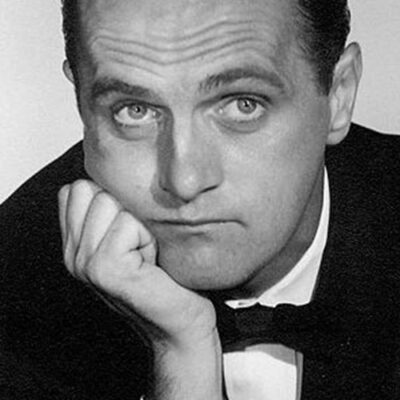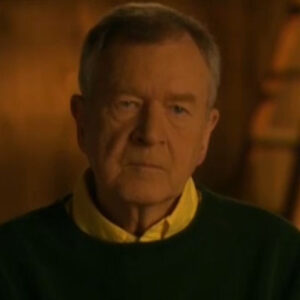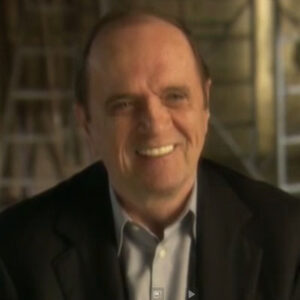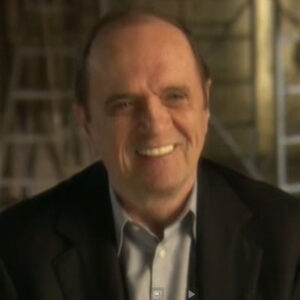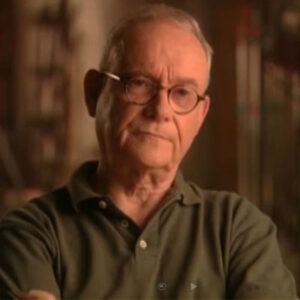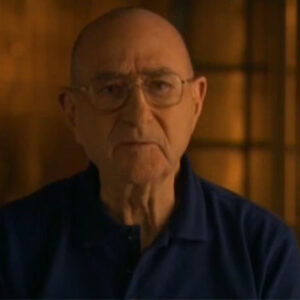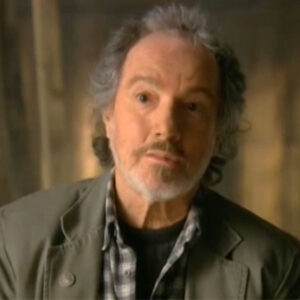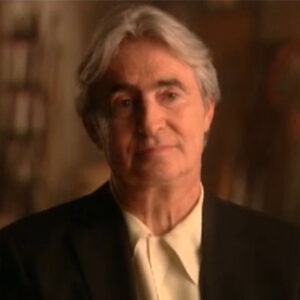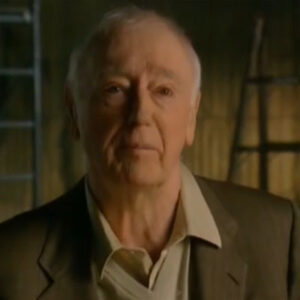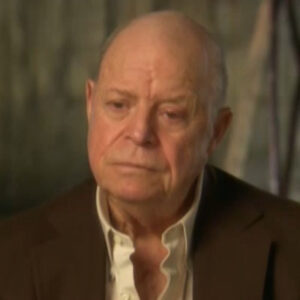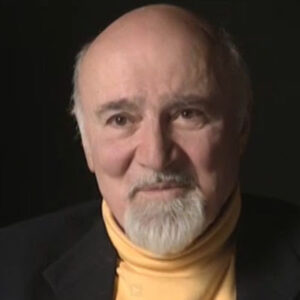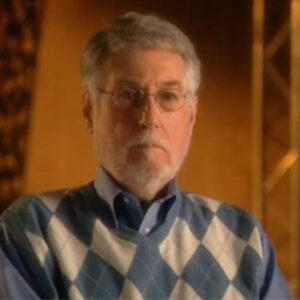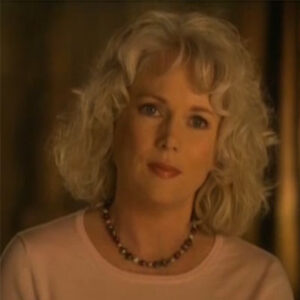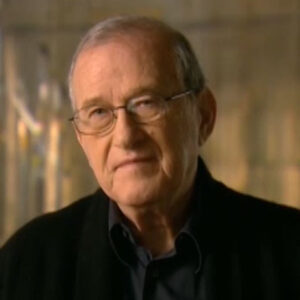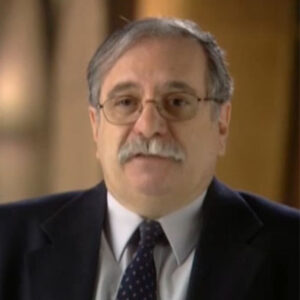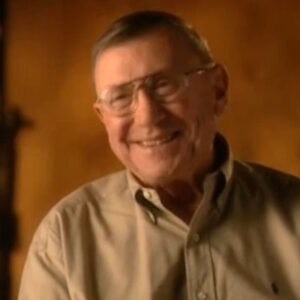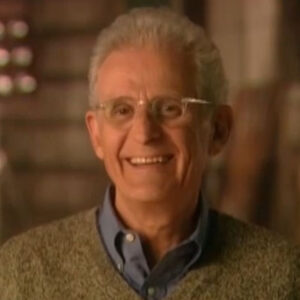Tim Conway: And look at you.
Interviewer: So you tell me. We talked a little bit on the phone about how you first became aware of Bob’s work through his albums and what you thought.
Tim Conway: I first became aware of Bob Newhart. I was working at a local radio television station in Cleveland. And this album came out. The button down mind of Bob Newhart and was one of those things that you had to have and then you had to invite three or four hundred people over to your house and sit around and just play it until the middle went through the grooves and the new. Went down and bought another one. It was the most inventive thing that had come along in a long time. And I was not familiar with Bob until that time, obviously, because. And he just exploded on scene and. Has never stopped exploding since. Yes.
Interviewer: What was it that was so you say was so inventive? What was it about it that was so different?
Tim Conway: Well, it was unique. First of all, if you were hiring people and Bob Newhart came in to interview, you would say thank you. As soon as he said, hi, I’m Bob Newhart, because he just doesn’t look like somebody that you’re going to have on your staff and go get them. Bob is a quiet mannered, extremely funny guy, but he’s not forceful. He doesn’t put himself on anybody. And so you would say, look, why don’t you just go back to whatever you were? What, you were an accountant. Why don’t you go back there and get a green shade and just sit there and do those numbers? I think that’s perfect job for you. But he and in delivering this material, he has the same attitude that it’s like he’s surprised that somebody is actually rolling something up in a piece of paper and smoking it. Walt. Sir Walter Raleigh is telling him we’ve got leaves and things and we won’t. Really? That’s terrific. Boy, that would really be good for us to do. And I was. In the car one time with Bob and his wife and my wife and we were coming home from dinner and having heard the driving instructor so many times before. And of course, his wife was very nervous with me driving. And I went to turn into the Bel Air Drive. And I didn’t realize that there was a little island there with flowers and everything, and there was oncoming traffic. And I was kind of trying to beat this car. And I drove up over the island, threw the flowers and on the other side. And Bob was just like he was doing his album. It’s OK. It’s all right. OK, OK, fine. We’re OK now. Never panicked or anything. His wife was screaming and trying to get out of the car. So he’s like that in real life. I mean, she’s quite mannered. Wonderful guy to be around.
Interviewer: So how was he different than most of the comedians?
Tim Conway: Most of the comedians at that time were either kind of like Borscht Circuit comedians. They went up and they had to yell at you because people weren’t listening. So they came out and shouted at you and shouted jokes at you and told you to shut up and listen to this. And we’re very broad and everything. Here’s this guy, Newhart, just standing there with a microphone and a phone going. Yes. What did you know? I’m wonderful, you know. And so it was it was kind of a new approach to humor at that time. There weren’t many quiet comedians because of vaudeville. You actually had to yell at people in the theater and they got used to doing that, especially when you were working in bars and things like that. I mean, people were throwing things at you and sometimes shooting you. So you had to talk fast and loud. And here’s this guy up there with this little sport going on. What do you say? Because he told me.
Interviewer: Do you think. Almost looks like you’re out. Oh, really? I’m not saying that. Look at me.
Tim Conway: I am looking at you. Oh, I’m sorry. Well, how about this? I just think that bad combination. So.
Interviewer: Do you think his demeanor, because he was so low key, sort of let him get away with saying things that maybe other people couldn’t? In a way, he was more subversive than he appeared in.
Tim Conway: Bob Newhart has never crossed the line into vulgar language or anything of that because he doesn’t have to. And he wouldn’t anyway, probably. He’s just a very soft spoken, very funny, gentle guy. And, yes, that kind of. Demeanor, I guess, really attracts your ear because you can’t hear what he’s saying. So you’re sitting there going. What and if if somebody else is talking, you go, would you shut up? Listen to this dilemma. So he never had a problem of getting on stage and getting attention because people just keep going. He must be talking. His lips are moving. Just shut up.
Interviewer: Did you ever see him perform in Vegas? I think of Vegas as being such. He’s so low key, it’s hard to sort of.
Tim Conway: Yes, I have. I’ve seen him perform in Vegas and he has total command of an audience that is drunk most of the time, certainly in the days when we all played Vegas, when before it became just a computer. I know it’s probably a most unlikely place for Bob to be because they’re rough there. And if you don’t do certain things, so it gets rougher. But Bob never had any problem. I mean, he was first of all, I could fill any house and he just quietly came out and this huge band behind him and they stopped playing because you couldn’t hear Bob. So it just they sat there and laughed along with Bob. He’s extremely entertaining. He just he thinks funny. He writes funny. He observes life. He observes people. And he recreate that kind of show for people. The business of Abraham Lincoln and changing the speech and everything, that probably is a kind of conversation that would take place between an agency nowadays and somebody who is. Going to do something that’s going to become public, you just sit down? Well, you know, I would keep the help. I think the hat is kind of a touch unusual. So, you know, and Bob captured all that. And you sit there and that’s what he’s all about.
Interviewer: What was Vegas like, heyday, 60, 70? What is it like for. To play there. How do you see, Bob kind of fitting in?
Speaker When I first did Vegas, I’ve heard a lot of. Well, first of all, being in Cleveland, Cleveland is pretty good when it comes to I not gangsters, but certainly people who were. Forceful, we might say. So I wasn’t unfamiliar with the crowd. And when I first came to Vegas, one of the gentlemen there had been working in the casino. They had blown up his car. And one of the other guys said it’s a good thing he wasn’t in it because he really would have been annoyed. So that’s the kind of life it was. I mean, it was just there was a lot of leveling going on there. And so it’s I’m I was totally out of place two hour after one show, one night. They said they were gonna do a benefit and it was going to start at two o’clock at night. And I was talking to this gentleman and I said, well, I don’t think I’ll be able to do that because I kind of have a sore throat. And I really I would really like to get to bed and rest. And he said, OK, we’ll pick you up about 130 then. OK, fine. That’ll be good. And I went and did the benefits of working in that kind of atmosphere and to see this quiet guy up here just laying these wonderful stories on you was so out of out of place, kind of, but very, very funny. Always has been.
Interviewer: Did you ever see him? Did he ever have to sort of ramp up his activity? I’ve seen some pictures of him doing a more Vegas version of himself.
Tim Conway: Yeah, I guess in a sense. But. It’s when people come to see certain people, you’ve got to see anyways. If he doesn’t sing Moon River, you’re really annoyed. So and it’s the same with Bob. You could go and see Bob and he could have all new material. And, you know, that was really great. But what do that thing with? You know, so Bob complies with that thought. And the audience is satisfied. He does throw in new stuff from time to time. And it’s wonderful. But there’s something about the old stuff. And first of all, having heard so much, most of the people who can actually do it along with him. I’m surprised that he doesn’t take a couple of dozen people up there with that kind of a chorus. OK. I thought so. Yeah. He does. He does wrap it up a little for Vegas. But as I said, he doesn’t wander into. You can take a two year old. That’s going to be safe.
Interviewer: What about we talked about this at a variety show in 1961. Tell me what what you said.
Tim Conway: I wasn’t sure that it was the same variety show we were talking about. He had one called the entertainers. He was part of the entertainers with Carol Burnett. And it was so disjointed. I mean, it wasn’t Bob’s fault. It’s just a disjointed show. And it didn’t didn’t have all that much success. I’m not sure that I ever saw his variety show. I know that he rushed into a variety show after the album. And as they will want to do is to really push you until you drop. And I don’t I don’t remember really actually seeing it that long. I don’t think I was on that long. Maybe that’s why. And I’m the king of it wasn’t on that long. My personalized license plate is 13 weeks because that’s how long my show is right. And then I had one that ran six weeks and now I’m down to a newsbreak. But, Bob. Had a lot of success on variety shows, he was always showing up on the Dean Martin show and at that time obviously there were 16 to 18 variety shows on at the same time during that time, the Hollywood Palace and all of us. So he was very successful in finding niches on The Ed Sullivan Show and things like that.
Interviewer: Why do you think he worked so well on TV? They started on albums, but they worked so well.
Tim Conway: So it’s it’s his demeanor. I mean, he is he comes on as this, you know, he’s the last guy you pick on a basketball team, you know? He just kind of hangs around and this quiet guy and nobody can really hear him. So even if he volunteered, you wouldn’t know where the voice came from. So it just me get. But on television, I mean, it was the perfect television is wonderful for. Reading people’s thoughts in their favor. I mean, Don Knotts, Tom Poston, Louie Najm and all of those guys. Bill Dana, you know, all of that crowd that you could read on their face, what they were thinking, how clever they were. They weren’t just selling material. They were selling themselves as to what they had seen and observed. And we’re just passing it on to you. And he was he was the television was very kind to him in that way.
Interviewer: Do you think, too, because I noticed his reactions, everything was kind of immediate, but TV can get.
Tim Conway: Yes. Yeah. TV reads you better, I think, than actually film. There is a difference. And TV really, you know, so many people have been very successful in TV and they jump over to film and it just doesn’t work. It’s it’s too much revealed on film. But TV centers on your face. Read your thoughts. There’s a lot of things and captures movements that for some reason, film doesn’t. And so it was a perfect spot for him.
Interviewer: What about. Can we talk? I guess we’re talking about the entertainers more. But you did talk about the difference between seeing him, especially in those early years, doing the monologues, his own pieces versus being in the sketches, even talked about that he wasn’t as comfortable. Can you?
Tim Conway: Well, I think people who, first of all, write their own material, which Bob does, are more comfortable doing their own material. And if you have to share it with somebody, it is it is kind of rough because that person may not quite understand what you’re trying to do. And the best part of working with people like when I do with Harvey Korman, when we worked together, the best thing for that person to do is to shut up. So rather than jumping in and trying either to top or contribute to just shut up because that person is on a roll doing something. So leave him alone. And Bob is that way. I mean, Bob’s on a roll just by himself. He doesn’t need anybody else. So if he has to go so far with one thought and then turn to somebody and say, and where were you? And they did something. And then he has to come back and do it. It doesn’t work as well as just Bob alone. And Bob, even when he was doing sitcoms. The focus was still on Bob, but you could have a room full of people, but you were always looking at Bob wondering what he was thinking about, what these people were doing. So he he really found a home and television, no question.
Interviewer: It is amazing when you look at those sitcoms. It seemed like he was just the person sitting there doing the right.
Tim Conway: Yeah, right. Once in a while, you have either a yes or no or just a dumb luck and you still a whole suit, not steal it. I mean, he you know, he just was the whole thing.
Interviewer: How hard is that when you look at that as an actor and a comedian, too? Is that unusual to be the person who. Is not doing the least.
Tim Conway: I think you know it. I think on The Burnett Show, I knew that I could do certain things that even though the focus wasn’t on me. People were looking for me to either comment or do something. And 10 times out of ten, I probably did. And Bob was the same way. I mean, he just he knew that he was the focal point. So I don’t have to put on a funny hat or the lampshade. And I know that people are looking at me. And if I. Want to contribute something at this point? I will, but it probably will just be worth a look or a smile or something. So he’s he’s very comfortable with that. And it takes you have to know who you are. The power that you have or the communication rather than power. But the communication you have with an audience and. Don’t abuse it. And service the people by actually doing something rather than just sitting there. Let’s get this over. Bob contributes and it also helps the whole production.
Interviewer: How similar is he to in real life? To say that some of the characters.
Tim Conway: I think there’s a similarity in most of the characters he’s played. So and that is a character of what he is in real life. I mean, that he’s he’s the guy that kind of stands off to the side. And you really don’t hear him. You have to listen to both fists first. Soft spoken. And, you know, you kind to go. You just find yourself focus and work. Whereas that whisper coming from somebody, you know, shut the door or as Paul. I’m sorry. Yes. What do you say? He officially gets your attention. So he has a great way of communicating without communicating. And it’s it’s a very likable kind of person because there’s no harm coming from Bob. He’s not going to come up, punch you and he’s not gonna yell at you or, you know, I I’ve never seen Bob yell. So I don’t I don’t know what that would be like to be kind of funny to I guess it’s like Don Knotts yelling, you know, dance lesson on all kind of side drugs. What do you say? I don’t know. He’s screaming something like where you can understand that,.
Interviewer: You, were part of that same incredible Saturday night lineup that Bob was. Can you tell me what that was about.
Tim Conway: Saturday night on television was about as good on a night of television that you could find in those days, the new art show and the Burnett Show and just the people stayed home on Saturday. That was annoying to a lot of store owners, you know, because people actually in those days, you really didn’t have tape machines if you had one. The only thing I really did was blink. I mean, no one knew how to run it or set it and had huge tape things. And by the time it taped it, it was gone. So you actually had to watch a show. And because there were three channels most of the time in those days. It only offered three places you can go. And Saturday night on CBS was just explosive. I mean, that was that was the night that you stayed home and the family got together. And that set became part of the family at that time. And so you sat around, you looked at it, you laughed at it. You all there. Many people have said, you know, the only time our family ever communicated was when you were watching television because we were all laughing and he would guide them and turn the set off. Nobody knew anybody. Whether you’re the father. I’m sorry. Yes. I mean, they just didn’t communicate unless they were doing something like that. And terrific entertainment. And so if you want to talk about show the next day, you had to watch it. So you watched it. I remember watching shows when television, not when it first came around, but as it came around and nobody could really afford one or was that much on. But you standing outside of a hardware inn? Well, it was snowing while the guy put one in the window so that you can actually see it. And people standing outside watching television. It was a great communal thing to go.
Interviewer: Do you think his show in particular was? I mean, it started in seventy two to seventy eight. Was it was it reflective somehow represented of that time period of the 70s?
Tim Conway: Yes. What happens with television was still inventing itself at that time. When. When television first started, it was pretty much vaudeville, it was Milton Berle and it was broad television. Jerry Lewis, Dean Martin, since these are all of that. But they were inventing television. They had taken from the stage of vaudeville and brought to the stage of television. These examples of what entertainment was in sketch form and created it. Then came kind of the family situation. Danny Thomas era, where you had, you know, a wife, a husband who could not obviously be seen in the same bed together. There had to be twin beds or restricted there. This cute child who said wonderful, funny things and a funny dog. I have six kids who were in their 30s and 40s, and so far they haven’t said that. Much amusing things. So I don’t know where these children came from. But, I mean, they were funny kids and was a great family life. There was obviously no language involved there because you just didn’t get involved in it cause you couldn’t and you probably wouldn’t anyway. So you looked at this. Television that was really saying. This is what family life is like, and it really was in a sense, and you’d say, well, we do that, too. But now the writers through the years have seen situation comedy and sitcoms and things, and they think that that is what now is. What television is all about. So you just keep duplicating the same thing. You get friends and many more friends, and then you’ve a lot of friends. And then there’s some friends. And then there’s friends who are different, but they’re living together. And then there’s these friends and it just kind of keeps repeating itself. Bob was in the era when they were inventing that family situation and had to be funny because you couldn’t wander into. Areas where you were talking about sex or anything like that, I mean, the word sex. Oh, my God. Did he actually say. So you stuck with what was funny to people and. What you know now, to me, it’s funny, like people who have medication and we have these protective tops. That’s wonderful. It protects children from the medication, but it also prevents people who can’t open those things from ever getting their medicine. Many people have died with the pills in their hand with the top on. If they only could have figure out how to push it or you squeeze it hard. What? I’m dying. Could somebody give me a hammer? So we picked up and things like that which were out of real life. And so did Bob and the driving instructor and all of his stuff that he appeared on television was really things that we had kind of seen before. And, you know, you have a situation comedy where you have this really dumb friend who is an airplane plane pilot. You really wouldn’t want to trust him, but you go, hey, what the heck, you know, this is this pretty good guy cannot find his way around town. He flies an airplane. So.
Interviewer: I mean, they had you know, we couldn’t talk about sex. But they had Bob and Emily sharing a bed.
Tim Conway: Yes. Yeah. They went. Bob and Emily went way beyond the sex periods of actually appearing in bed. Dick Van Dyke could not do that, as you know. I mean, that they had to have twin beds and most of the scenes before that had twin beds because. Oh, my gosh, what what could that lead to if they worked together? Oh. So, yeah, a day that was and was a great. Place for them to communicate. And what a great ending to his second or third or fourth or God, he’s had 400 series when they just said, what’s a dream? I mean that. And I suppose Pop’s already told you that was his wife’s idea. And. Yeah.
Interviewer: Actually, I want to ask about his wife, since you know him so well recently. Can you tell me how they do know the story of how they met?
Tim Conway: I think she interrupted him because she interrupts him a lot now. So he must have been doing something and she interrupted him and he said, don’t interrupt. And she said, I’m Judy. And they got married. And she said, I’m going to have to go on and interrupt you. It’s funny. Bob will start a story and he’ll be pointing towards an ending and she’ll say, yeah. So then the car ran over that guy. Embargo. Yeah. Yeah, that was pretty much it. Yes, sir. Is there any more asparagus?
Interviewer: She hasn’t learned.
Speaker No. Hasn’t quite learned yet. She’s the great interruption.
Interviewer: How how important that was for you seems like such a family person, and how have you seen him incorporate that into his.
Tim Conway: Well, I think we both have the same feeling about our families. That they’re a very important part of our life and a more important part than show business. And you try to balance, you know, all of these things and you’re working and you should bring the kids in and everybody should remain a family and be happy and all of that. I put an A.T.M. window into my house, so I really don’t have to communicate with them that much anymore, and they just come in and show me the card I slip at 20. But Bob actually has some come in. He’ll even come in for dinner and stuff. So he’s much more a family man than I ever would think of being. But he’s very family oriented. And his grandchildren. And he’s you know, he’s out there playing with them as much as any other grandparent would. Along with Jenny. They’re very, very, very family or family oriented.
Interviewer: He would take his kids on the road.
Tim Conway: Yes. Yes. I would leave my kids. I would take him for a while. But then I would leave them on the road. And then you’d see them in the rear view mirror and that. They just knew that that was as far as I was gonna take that noise and yelling and screaming.
Interviewer: Bob is a saint.
Tim Conway: Bob is a saint.
Interviewer: Tell me who some of Bob’s best friends are a lot of comedians, I guess.
Tim Conway: Well, Bob enjoys the company of Dick Martin. I guess as comedian, comedian, Wise was certainly Rickles. And now there’s a combination that you really wonder how that ever got together. I mean, Don is just very wicked and very cruel and very honest and very funny. And he makes more fun of Bob. And Bob just sits there and takes it. But they’re very good friends. They go on vacations together. The two most unlikely people you would ever think that would go somewhere to go there. The two wives get along wonderfully. And Jimmy and Don and Bob going around the world yelling at each other. And it just I can’t imagine how that ever works out, but I guess it does for my conures. And I think Bob kind of hangs around with the old school. You know, him is a member of Bel Air Country Club and a very good golfer. He tells everybody and his friendship with Don Rickles.
Interviewer: So there’s more maybe to Bob that he’s not quite as just, you know spank and clean as.
Tim Conway: Oh, yes. Oh, yeah. Bob and Don is just I mean, he is downright cruel. And in a nightclub, you show up and you just are prepared to be a. Just sliced. That’s all he has to say. Once he sees you, it’s over. And he will. I don’t know. It’s good. It’s over for you, you know. Yeah, I don’t know. But Bob is has a dark side and a very he could he could certainly tell you some stories that, you know, you wouldn’t. You wouldn’t. My goodness. Bobby, I didn’t realize that you felt that way. You don’t want to sit next to Bob at a funeral because that’s very dangerous. We want to get a couple of rows away from him.
Interviewer: He has a more wicked sense of humor than he lets on.
Tim Conway: Bob has a very, very bright, wicked side, too. Yes. And right on the button, you know, a lot of guys a mumble around until they come up with something funny. Bob, just say just come. Whatever he comes out with is funny. And it’s so well constructed. And the funniest thing, anything that’s been said tonight.
Interviewer: Do you think you know that old adage that so many comedians come from? Pain or anger? You know, there are comedies, and by that, I don’t know, as Bob, the exception to that is there, again, more under there than you.
Tim Conway: I don’t you know, Bob and I have talked about that, about comedians coming from pain. And I unfortunately was never beaten by my parents or they never threw me out or I just didn’t have any tragedy to talk about. And Bob doesn’t either. That I know of. So I don’t know where he got the sense of humor. It certainly wasn’t from pain, agony and torture. I think he just got the sense of humor from the fact that he was doing certain jobs, that he knew he wasn’t going to spend the rest of his life in and was looking for a way out. Accounting was not Bob’s. Although he looks like an accountant. It wasn’t a targeted occupation for him. And he was just kind of wandering around until he came up with these album, this album. And Bob was not the kind of guy who would, you know, who was doing nightclub entertaining and going down last night from Saturday night. I’m opening down here that that wasn’t the case. He was just a funny guy in the office. And somebody said, once you write that stuff down and record it and see what happens and. Actually, Steve Allen, I believe, was the one who said the bar blook. I’ll record this for you. I want I don’t want you know, I just want you to have this. I don’t want you to make sure that you can have this record and look back on it someday and see how funny this actually was. Very inspirational.
Interviewer: I didn’t know that. That’s interesting.
Tim Conway: I made it up.

